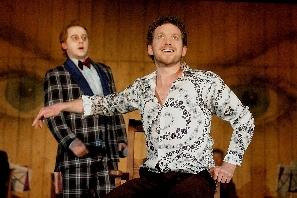Twelfth Night review from November 2005
Transvestism, binge-drinking, street-fighting, a practical joke taken to extremes, mistaken identity - it could be any night on one or more of the UK's TV channels, you might think. Not so. It's all part of the complex plot of Shakespeare's 'Twelfth Night' currently being performed by the Royal Shakespeare Company at the newly-revamped and renamed Novello Theatre.
Following the series of tragedies they performed last season, the RSC have moved on to tackle the comedies: 'The Comedy of Errors', 'A Midsummer Night's Dream' and 'As You Like it' are soon to follow.
The plot involves some of Shakespeare's favourite themes: shipwrecks, twins and mistaken identity, and revolves around Viola and her twin brother, Sebastian, who have been shipwrecked off the coast of Illyria. Now separated, both twins believe the other to have been drowned. Viola decides to disguise herself as a boy, and enters the service of Duke Orsino who's desperate to win the love of Olivia, a neighbouring Countess. However, Olivia is in mourning and is having none of Orsino's amorous advances, so he tries a different tack by sending Viola (now the 'boy', Caesario) to woo Olivia on his behalf. Caesario does indeed win over Olivia who falls in love with 'him' (really a her, of course), which rather puts Caesario in a bit of a predicament.
The comedic element is provided in a kind of sub-plot involving the drunken cousin of Olivia, aptly named Sir Toby Belch, and his side-kick, Sir Andrew Aguecheek, who, together with Olivia's companion, Maria, decide to play a practical joke on Olivia's steward, Malvolio, which has more than a little cruelty and undue vindictiveness to it. Written in (or around) 1601, 'Twelfth Night' is a comedy with a moody side to it, which this production brings out quite admirably. In particular, the opening scene with the love-sick Orsino has some very fine music with an atmospheric, jazzy-blues kind of feel to it. This musical theme is continued in other parts of the production, and highlighted in particular in Forbes Masson's moving and evocative vocal style - in fact, a highly impressive performance all-round from him as Feste, the clown. Also of note in the acting department was Aislín McGuckin as Olivia, who ably combined femininity with authoritative stature. And Meg Fraser provided a believable blend of earthiness and intelligence in her portrayal of Olivia's companion, Maria.
'Twelfth Night' contains two of the most often quoted lines in Shakespeare's work: "If music be the food of love, play on", and "Some are born great, some achieve greatness, and some have greatness thrust upon them". But I'm not a great fan of the play itself, in large part because the 'mistaken identity' element has always seemed to me to be rather far-fetched and contrived (though apparently, non-identical twins can look very similar).
I'm something of a traditionalist when it comes to performances of Shakespeare's plays, and always feel a little cheated when, as is the case here, his plays are performed in modern costume. But the design here doesn't grate because there's no definite and pervading period or style embodied either in the costumes or set - it could almost be any time and any place.
Tom Piper's design includes some interesting staging, particularly in the shipwreck effects that require a considerable amount of bravery on the part of several of the cast. But the finale was less impressive. The back curtain is slowly drawn-up to reveal the bare stage wall as the foreground action resolves the mistaken identity, and Olivia and Orsino get their 'men', as one might put it. The novelty and symbolism of this effect was somewhat tarnished for me because I've seen an almost identical effect in the National Theatre's recent production of 'Pillars of the Community'. I didn't like the effect in the National production, and I thought it equally distracting and unnecessary here.
Gripes aside, Michael Boyd's production has some refreshing qualities - the music in particular. But it's most memorable facet will almost certainly be Forbes Masson's exceptional characterisation and vocal talents.
(Peter Brown)
Photo by Ellie Kurttz
Originally published on
